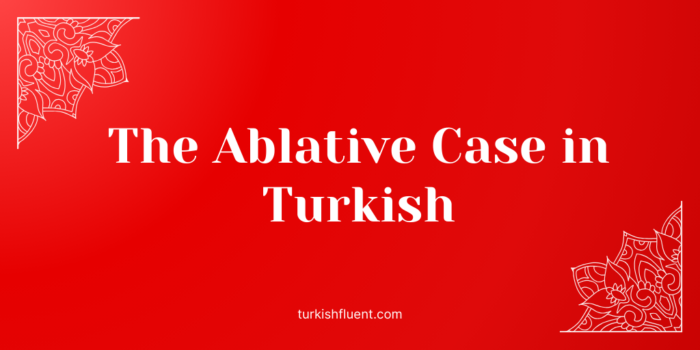The ablative case in Turkish, known as Uzaklaşma Durumu, is primarily used to indicate movement or separation away from a person, place, or object. Mastering this case in Turkish will help you express origin, departure, comparison, cause, and various other nuances involving distancing or moving away from something. It is most commonly translated as “from” in English. In this guide, we’ll explore how and when to use the ablative case in Turkish.
How to Form the Ablative Case
The ablative case is formed by adding the suffixes -den/-dan (or their variants -ten/-tan), depending on vowel harmony and the final consonant of the noun (consonant harmony):
| Last vowel of noun | Ablative suffix | Ablative suffix after voiceless consonants (f, s, t, k, ç, ş, h, p) |
|---|---|---|
| a, ı, o, u | -dan | -tan |
| e, i, ö, ü | -den | -ten |
Examples:
- uçak (plane) → uçaktan (from the plane)
- market (market) → marketten (from the market)
- kitap (book) → kitaptan (from the book)
- şehir (city) → şehirden (from the city)
- ofis (office) → ofisten (from the office)
- park (park) → parktan (from the park)
When to Use the Ablative Case
The ablative case is highly versatile and is used in multiple contexts:
Indicating Origin or Departure
This is the most common use, describing movement away from a location or an origin point:
- Ben uçaktan indim. (I got off the plane.)
- Marketten bir şişe kırmızı şarap aldım. (I got a bottle of red wine from the market.)
- O, Meksika’dan geliyor. (She/He is coming from Mexico.)
- Biz okuldan eve döndük. (We returned home from school.)
Expressing Fear or Aversion
The ablative case is often used with verbs indicating emotional reactions, particularly aversion or fear:
- Kız arkadaşım sigaradan nefret ediyor. (My girlfriend hates cigarettes.)
- Annem yılandan korkuyor. (My mother is afraid of snakes.)
- Ali köpekten çekiniyor. (Ali is wary of dogs.)
Making Comparisons (Equivalent to “than” in English)
The ablative case is also used to express comparisons. It is attached to the object from which something is being compared:
- Bugün dünden daha sıcak. (Today is hotter than yesterday.)
- Bu araba o arabadan daha hızlı. (This car is faster than that car.)
- Ahmet, Mehmet’ten daha uzun. (Ahmet is taller than Mehmet.)
Expressing Reason or Cause
You can use the ablative to indicate the reason or cause behind an action or event:
- Yorgunluktan uyuyamadım. (I couldn’t sleep from tiredness.)
- Mutluluktan ağladı. (She cried from happiness.)
- Heyecandan konuşamadı. (He couldn’t speak from excitement.)
Indicating Material or Composition
You can specify the material or substance something is made of with the ablative suffixes:
- Masa tahtadan yapılmış. (The table is made of wood.)
- Kazak yünden yapılmış. (The sweater is made of wool.)
- Şişe camdan yapılmış. (The bottle is made of glass.)
Time and Abstract Departure
It is also occasionally used metaphorically or abstractly, especially with time expressions (see how to express before and after in Turkish):
- Sabah erkenden evden çıktım. (I left home early in the morning.)
- Toplantı saat üçten sonra başlayacak. (The meeting will start after three o’clock.)
The use of the ablative case in Turkish is straightforward yet highly practical. To continue learning about Turkish grammar, explore the accusative case, another useful one!
